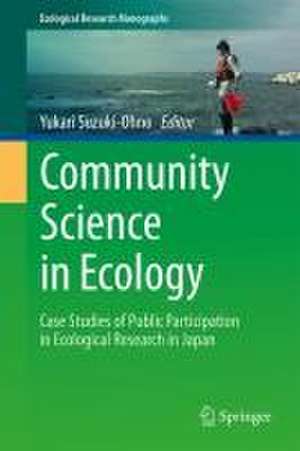Community Science in Ecology: Case Studies of Public Participation in Ecological Research in Japan: Ecological Research Monographs
Editat de Yukari Suzuki-Ohnoen Limba Engleză Hardback – 25 iun 2024
This book introduces community science (or citizen science) projects in Japan with a focus on ecology. Environments and ecosystems that have been slowly built up over time are changing and collapsing dramatically. In this rapidly changing environment, ecologists need to collaborate with volunteers in their research and activities to investigate and conserve a vast area. This book aims to guide ecologists in the practice of community science. The authors, who are leading ecologists and practitioners of community science projects, share their methods and lessons learned from practice.
The book begins with the definition of community science and the following chapters introduce monitoring in ecological community science, using various methods such as observation, specimens, photographs, videos, sounds, and environmental DNA. Readers can learn about the advantages and disadvantages of these methods in ecological community science monitoring. The book also coverstopics such as scientific communication, data obtained from ecological community science monitoring, the rights of participants, decision-making in community science, and conservation activities with volunteers such as invasive alien species extermination and nature restoration.
This book serves as a valuable resource for readers interested in ecological community science and its practice. The book is suitable for both undergraduate students and researchers as well as practitioners.
Din seria Ecological Research Monographs
- 18%
 Preț: 892.90 lei
Preț: 892.90 lei - 18%
 Preț: 947.50 lei
Preț: 947.50 lei - 15%
 Preț: 641.53 lei
Preț: 641.53 lei - 18%
 Preț: 1119.87 lei
Preț: 1119.87 lei - 18%
 Preț: 1235.08 lei
Preț: 1235.08 lei - 18%
 Preț: 1114.21 lei
Preț: 1114.21 lei - 18%
 Preț: 1123.35 lei
Preț: 1123.35 lei - 24%
 Preț: 772.24 lei
Preț: 772.24 lei - 24%
 Preț: 836.70 lei
Preț: 836.70 lei - 24%
 Preț: 833.35 lei
Preț: 833.35 lei - 18%
 Preț: 1116.26 lei
Preț: 1116.26 lei - 15%
 Preț: 706.63 lei
Preț: 706.63 lei - 18%
 Preț: 1382.83 lei
Preț: 1382.83 lei - 15%
 Preț: 635.15 lei
Preț: 635.15 lei - 18%
 Preț: 937.09 lei
Preț: 937.09 lei - 18%
 Preț: 957.62 lei
Preț: 957.62 lei - 18%
 Preț: 946.55 lei
Preț: 946.55 lei - 15%
 Preț: 651.99 lei
Preț: 651.99 lei - 18%
 Preț: 1231.47 lei
Preț: 1231.47 lei - 18%
 Preț: 964.71 lei
Preț: 964.71 lei - 20%
 Preț: 573.21 lei
Preț: 573.21 lei - 24%
 Preț: 938.23 lei
Preț: 938.23 lei -
 Preț: 362.99 lei
Preț: 362.99 lei -
 Preț: 328.42 lei
Preț: 328.42 lei - 24%
 Preț: 903.49 lei
Preț: 903.49 lei - 24%
 Preț: 1231.53 lei
Preț: 1231.53 lei
Preț: 1003.24 lei
Preț vechi: 1223.47 lei
-18% Nou
Puncte Express: 1505
Preț estimativ în valută:
192.03€ • 208.66$ • 161.41£
192.03€ • 208.66$ • 161.41£
Carte disponibilă
Livrare economică 31 martie-14 aprilie
Preluare comenzi: 021 569.72.76
Specificații
ISBN-13: 9789819703036
ISBN-10: 9819703034
Ilustrații: X, 218 p. 78 illus., 54 illus. in color.
Dimensiuni: 155 x 235 mm
Greutate: 0.54 kg
Ediția:2024
Editura: Springer Nature Singapore
Colecția Springer
Seria Ecological Research Monographs
Locul publicării:Singapore, Singapore
ISBN-10: 9819703034
Ilustrații: X, 218 p. 78 illus., 54 illus. in color.
Dimensiuni: 155 x 235 mm
Greutate: 0.54 kg
Ediția:2024
Editura: Springer Nature Singapore
Colecția Springer
Seria Ecological Research Monographs
Locul publicării:Singapore, Singapore
Cuprins
Chapter 1. Introduction.- Chapter 2. Fundamental Ideas and Concepts in Citizen Science.- Chapter 3. Practicing collaborative biodiversity research with high schools to benefit both education and invasive species monitoring.- Chapter 4. Hanamaru-Maruhana (Bumble bee) National Census Using Photographs.- Chapter 5. Cyberforest Using Video and Sounds.- Chapter 6. Community Science Initiatives Utilizing Environmental DNA.- Chapter 7. Diverse motivations in citizen science.- Chapter 8. Dandelion Survey - Western Japan 2020, Kochi Prefecture.- Chapter 9. Citizen Science and Natural History Museums in Japan.- Chapter 10. Science Communication: Bridging between Science and Society.- Chapter 11. The essential principle for appropriate data policy of citizen science projects: Correspondence for the diverse and transmutable attributes of participants.- Chapter 12. Citizen science for social decision-making: Avoiding missteps and unlocking potentials.- Chapter 13. The Importance of Dialogue between Science and the Public Shown in the Invasive Bumblebee Problem.- Chapter 14. Management of wetland ecosystems with the participation of citizens.- Chapter 15. Editor’s note.
Notă biografică
Yukari Suzuki-Ohnois a researcher at the Center for Sustainable Society. She has been an Assistant Professor at the Graduate School of Life Sciences, Tohoku University, Japan, from 2020 to 2023. Her research interests include community science, ecological modeling, and conservation ecology.
Textul de pe ultima copertă
This book introduces community science (or citizen science) projects in Japan with a focus on ecology. Environments and ecosystems that have been slowly built up over time are changing and collapsing dramatically. In this rapidly changing environment, ecologists need to collaborate with volunteers in their research and activities to investigate and conserve a vast area. This book aims to guide ecologists in the practice of community science. The authors, who are leading ecologists and practitioners of community science projects, share their methods and lessons learned from practice.
The book begins with the definition of community science and the following chapters introduce monitoring in ecological community science, using various methods such as observation, specimens, photographs, videos, sounds, and environmental DNA. Readers can learn about the advantages and disadvantages of these methods in ecological community science monitoring. The book also covers topics such as scientific communication, data obtained from ecological community science monitoring, the rights of participants, decision-making in community science, and conservation activities with volunteers such as invasive alien species extermination and nature restoration.
This book serves as a valuable resource for readers interested in ecological community science and its practice. The book is suitable for both undergraduate students and researchers as well as practitioners.
Caracteristici
Introduces ecological community science (citizen science) programs in Japan Covers monitoring methods including observation, specimens, photographs, sounds, and eDNA in community science programs Covers topics related to ecological community science such as science communication, data policy, and decision-making
